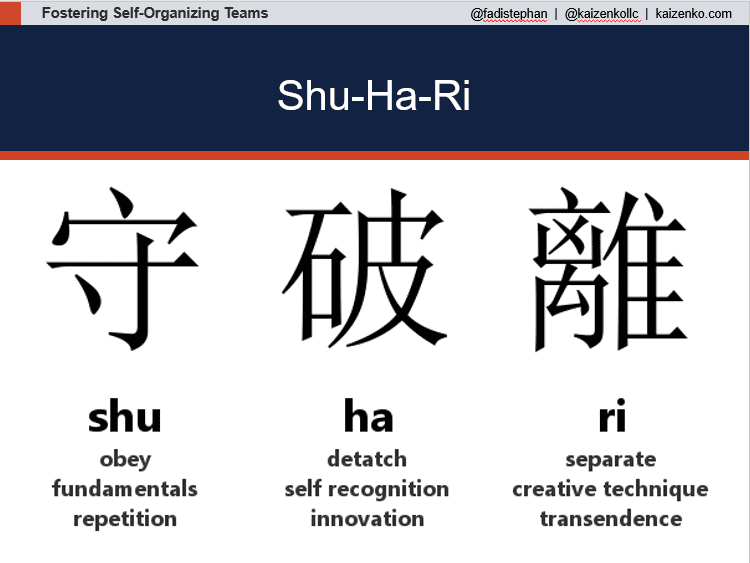Alistair Cockburn made the analogy to Aikido (Japanese martial art) in terms of how we learn a technique and get better at it from beginner/novice, to journeyman, to master. There are 3 stages of gaining knowledge:
Shu – Beginner stage
In shu, we repeat the forms and discipline ourselves so that our bodies absorb the forms that our forebears created. We remain faithful to these forms with no deviation.
https://en.wikipedia.org/wiki/Shuhari
Here we follow the teaching of the master. Follow the instruction or rules as laid out without worrying about the why or the theory behind certain things. There is a preference for one option as many options of doing the same thing will just create confusion.
Ha – The Journeyman stage
In ha, once we have disciplined ourselves to acquire the forms and movements, we make innovations. In this process the forms may be broken and discarded.
https://en.wikipedia.org/wiki/Shuhari
In Ha, we are beyond the basics and now understand the theory behind why we do certain things. We can clearly evaluate different alternatives and decide on which one to take.
Ri – The master stage
In ri, we completely depart from the forms, open the door to creative technique, and arrive in a place where we act in accordance with what our heart/mind desires, unhindered while not overstepping laws.
https://en.wikipedia.org/wiki/Shuhari
In Ri, we are going beyond learning from others, but learning from our own experience and adapting the rules for different circumstances and creating our own approaches.
When I presented this talk at the Munich Global Scrum Gathering, it was my first trip to Munich. If I needed to go from point A to point B, I’m in a new setting and I’m at the Shu state. I need directions to follow a map or preferably a guide that can lead me and show me the way. If you give me more than 1 set of directions, that’s kind of too much information.
After being there for a couple of days, I got the general lay of the land and was able to wander on my own and know where to turn right or left or pick alternative between 2 routes. That’s the Ha level.
Back home in DC, my commute to work is just common nature. I do it without even thinking about it. I just get in the car and drive and 25 minutes later I’m at work. If there is traffic, I discover alternate routes or shortcuts on my own that puts me right back on track. This is the Ri level.
Next up Dreyfus Skills Acquisition Model.
Also check out the complete Fostering Self-organizing Teams series:
- What is a Self-organizing Team?
- Scrum Magic! Do Scrum – Become Hype-productive!
- 3 Models for Skills Acquisition
- Shu Ha Ri
- The Dreyfus Model of Skills Acquisition
- Situational Leadership
- Tuckman’s Stages of Group Development
- Drexler/Sibbet Team Performance Model
- The ScrumMaster’s Role is Fostering a High Performing Self-Organizing Team
- 7 Attributes of a Self-Organizing Team
- Delegation Board for Fostering a Self-Organizing Team
- The ScrumMaster’s Progressive Delegation Responsibility
- Fostering Self-Organizing Teams Presentation
